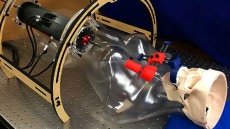Chronic stress activates a hormone that reduces fertility long after the stress has ended, but blocking this hormone returns female reproductive behaviour to normal, a research on rats has suggested.
Blocking the gene for the hormone -- called gonadotropin inhibitory hormone (GnIH) -- could help women overcome the negative reproductive consequences of stress, the findings suggested.
"What is absolutely amazing is that one single gene controls this complex reproductive system, and that you can elegantly knock this gene down and change the reproductive outcome completely," said Daniela Kaufer, an associate professor of integrative biology at the University of California in Berkeley, US.
"We know that human GnIH is present in the human brain and gonads, and that it inhibits the production of steroids in human ovaries, so certainly the potential is there for it to be manipulated to address human infertility," George Bentley from the University of Caifornia pointed out.
"GnIH seems to be the main player, because it is elevated in the brain's hypothalamus for a full estrus cycle after the stress ends," Kaufer noted. "When we knocked down levels of GnIH, we restored all reproductive behaviour back to normal."
The findings appeared in the journal eLife.





